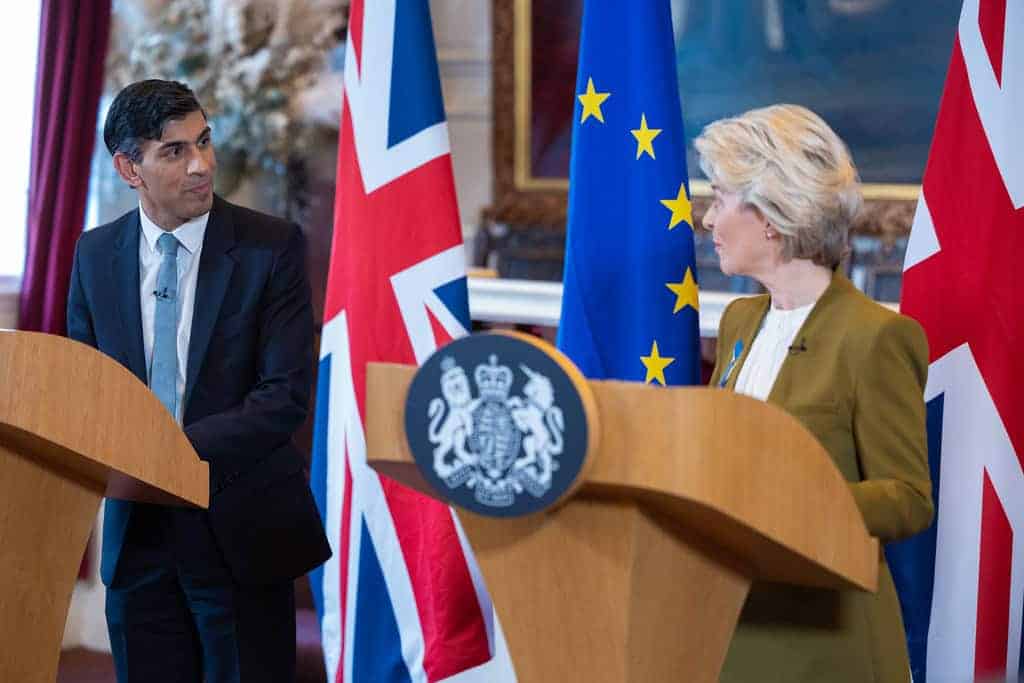An agreement between the UK and EU on trading arrangements in Northern Ireland will allow the UK to take steps to realign with the continent’s research funding program Horizon Europe.
As soon as the Windsor Framework is implemented, EU president Ursula von der Leyen said work on the UK’s association to Horizon will start “immediately”.
The EU chief met UK prime minister Rishi Sunak in the UK on February 27 to agree a new Brexit deal on Northern Ireland. The agreement in principle will see new trading operations between the UK, Northern Ireland and mainland Europe.
Von der Leyen said that the deal was “good news for scientists and researchers in the EU and in the UK”.
“The moment [the agreement] is implemented I’m happy to start immediately right now the work on an association agreement which is the pre-condition to join Horizon Europe,” she said during her trip to the UK.
In a statement, UUK chief executive, Vivienne Stern, said the organisation was “relieved to hear that the Windsor Framework has been agreed”.
“The removal of this political roadblock must now lead to the rapid confirmation of UK association to Horizon Europe, Copernicus and Euratom, as set out in the Trade and Cooperation Agreement,” she said.
“Full association with Horizon continues to be best outcome for both the UK, and for our research partners across Europe and beyond. We urge all sides to start the necessary talks now so that association can take effect as soon as the Framework is implemented.”
The FT reported that final negotiations are likely to take between six and nine months. Financial arrangements are yet to be clarified as well as the scale and areas the UK will participate in.
UUK has led the #SticktoScience campaign – together with Swiss partners who still remain outside the EU program – calling for an “open and barrier-free collaboration among Europe’s research and innovation actors”.
The German U15, The Guild of European Research-Intensive Universities, Udice in France, as well as the UK’s Russell Group are just some of the organisations that have warned that “failure to move forward with UK association would be bad news for research and a second best outcome”.
Speaking with BBC Radio 4’s World at One program, former president of the Royal Society and chief executive and director of the Francis Crick Institute, Paul Nurse, said the move was “fantastic news for science”.
“We’ve been on tenterhooks for many months,” he said. “The only thing standing in the way of association was the Northern Ireland protocol. [UK] government policy is to associate and now they are able to do so, and now the EU wishes to see that happen too.”
“We’ve been on tenterhooks for many months”
The UK had set out contingency plans if association to the program did fail, which Nurse said should now “fall by the wayside”.
“The ones that had been put in place were with small countries or countries a long way away,” he said. “They were in no sense a substitute for the connection with Europe.”
However, Nurse noted that the Windsor Framework still need to be implemented.
“If this finally doesn’t get through [UK parliament]… what we should be doing in this country [UK] is actually replicating what is done in Europe through their various initiatives as much as we can, so that when eventually we are be able to associate, it will be easy to do that,” he said.
“Honestly, it’s better to have a halfway step than no step at all. We were in danger of floating off, frankly, into the cold northeast Atlantic, where the only company we might have had is Greenland. And I like Greenland, but this wasn’t good for our science. What we see here are the first steps in getting back into that European science fold. It’s really, really important for the entire UK science endeavour.”










